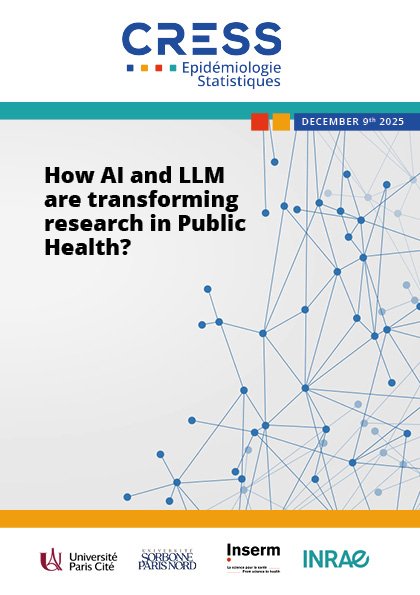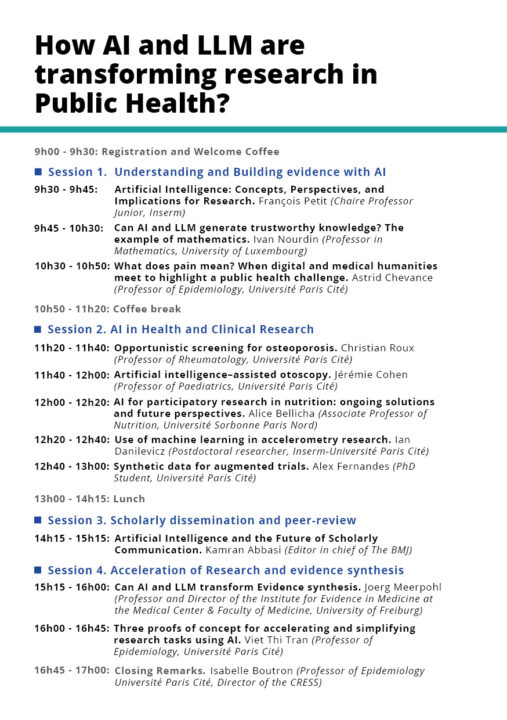Symposium scientifique CRESS « How AI and LLM are transforming research in Public Health? »
Symposium scientifique CRESS « How AI and LLM are transforming research in Public Health? »
Cet événement a pour objectif d’explorer les transformations majeures que l’intelligence artificielle (IA) et les grands modèles de langage (LLM) opèrent dans le domaine de la recherche épidémiologique : de la construction des preuves à la synthèse des connaissances, en passant par l’évaluation par les pairs.
Experts nationaux et internationaux
- Localisation : Site Odéon Université Paris Cité
- Date : mardi 09 décembre 2025
Inscription obligatoire :
- Pour les personnels du CRESS : https://framaforms.org/how-ai-and-llm-are-transforming-research-in-public-health-1760624777
- Pour les participants extérieurs au CRESS : https://framaforms.org/how-ai-and-llm-are-transforming-research-in-public-health-1760681630
Programme
9:00 – 9:30: Registration & welcome coffee
- 9:30-9:45: Artificial Intelligence: Concepts, Perspectives, and Implications for Research. François Petit (Chaire Professor Junior, Inserm)
- 9:45-10:30 : Keynote Speech. Can AI and LLM generate trustworthy knowledge? The example of mathematics. Ivan Nourdin (Professor in Mathematics, University of Luxembourg).
- 10:30 – 10:50 : What does pain mean? When digital and medical humanities meet to highlight a public health challenge. Astrid Chevance (Professor of Epidemiology, Université Paris Cité
10:50 – 11:20: Coffee break
- 11:20 – 11:40: Opportunistic screening for osteoporosis. Christian Roux (Professor of Rheumatology, Université Paris Cité)
- 11:40 – 12:00: Artificial intelligence–assisted otoscopy. Jérémie Cohen (Professor of Paediatrics, Université Paris Cité)
- 12:00 – 12:20: AI for participatory research in nutrition: ongoing solutions and future perspectives. Alice Bellicha (Associate Professor of Nutrition, Université Sorbonne Paris Nord)
- 12:20 – 12:40: Use of machine learning in accelerometry research. Ian Danilevicz (Postdoctoral researcher, Inserm-Université Paris Cité)
- 12:40 – 13:00: Synthetic data for augmented trials. Alex Fernandes (PhD Student, Université Paris Cité)
13:00 – 14:15: Lunch
- 14:15 – 15:15 : Keynote Speech. Kamran Abbasi (Editor in chief of The BMJ)
- 15:15 – 16:00 : Can AI and LLM transform Evidence synthesis. Joerg Meerpohl (Professor and Director of the Institute for Evidence in Medicine at the Medical Center & Faculty of Medicine, University of Freiburg)
- 16:00 – 16:45 : Three proofs of concept for accelerating and simplifying research tasks using AI. Viet Thi Tran (Professor of Epidemiology, Université Paris Cité)
Isabelle Boutron is Professor of Epidemiology at Université Paris Cité, Director of the Centre for Research in Epidemiology and Statistics (CRESS), and Director of Cochrane France.

